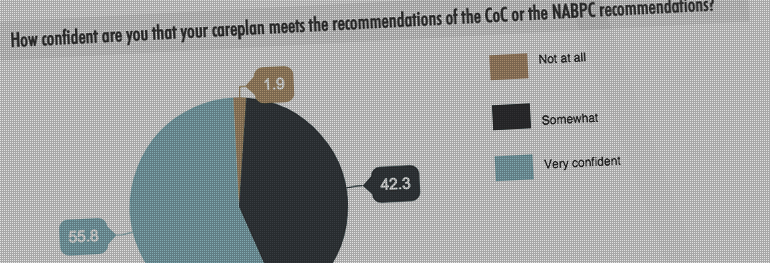
On March 6, 2015, Carevive Health hosted a webinar on survivorship program development and evaluation with survivorship experts Drs. Deborah K. Mayer, PhD, RN, AOCN, FAAN and Jennifer R. Klemp, PhD, MPH and Alicia Rosales, LCSW, OSW-C. We had 423 registrants and 238 live attendees, which speaks loudly to how many of you across the country are working hard to overcome the challenges of survivorship care plan delivery, and the goal of our webinar was to not only give pragmatic strategies but also to highlight the tremendous opportunity that survivorship care offers to improve quality care, patient satisfaction, and greater value.
As part of the webinar we hosted a poll to better understand the current state of delivering survivorship care plans (SCPs) across the U.S. As a prior survivorship program director and current provider of SCPs myself, I wanted to know … what care plans are people using nowadays? How are they creating their content and maintaining it? How confident are they in its evidence base? What do people wish they could change? I found our survey results quite provocative They mirrored much of what we know from prior study, but also gave new insights. And they further deepened my confidence at Carevive Health we are doing just what is needed to improve the quality, value, ease, and evidence-based approach of survivorship care plan delivery
Here is what we learned:
Results
Our survey results are displayed graphically in Figure 1. The findings are quite striking.
Figure 1.
![[Infographic] Poll Data: Survivorship Webinar Participants Speak Out: Care Plan Improvements Needed](http://carevive.wpengine.com/wp-content/uploads/2015/03/infographic_poll_data.jpg)
The majority (70%) of cancer care providers in our poll either do not believe or are unsure if their care plans content is current, and 42% lack confidence in their SCPs’ ability to meet accreditation standards. Even this suboptimal confidence may be unwarranted; in a 2011 study of academic and community cancer centers, colleagues and I found that only 15% of sites had SCPs that achieved ≥75% overall concordance with IOM standards (Stricker et al., 2011)1. Further, our poll indicates that while many are using SCP templates embedded within your EHR (41%), very few (only 14%) of centers made care plans available to patients electronically, while almost 70% said they wished they could. Importantly, data from Carevive’s pilot studies confirm that enduring and electronically available care plans are important to survivors. In qualitative interviews with patients selected from over 100 breast and gynecological cancer survivors receiving Carevive care plans (Brant et al., 2015)2, women indicated that they frequently accessed their care plans and embedded resources online after the visit, and even shared them electronically with their family (see Box 1). Data from these studies also showed the importance to survivors of having information to help them manage persistent symptoms (also see Box 1), yet only 35% of our survey respondents said their SCP’s included such advice. Survivors in our study also indicated they wished they had received care plans for symptom management earlier in treatment, which is another offering provided by Carevive Health.
Box 1: Survivor comments on Carevive care plans
“All the good articles in there and hyperlinks to resources at my cancer center were things I used both right away and later as my issues changed”
“So helpful I shared it (via email) with my family and another patient, too.”
“With the Carevive care plans, I have all the information I need right here…and it was really neat, too… I would only get the information that I needed for myself … so that was good!”
“I have gone back to my care plan many times. I keep it handy.”
“The care plan was very helpful to me in managing my symptoms… so helpful, in fact, I wish I had had it earlier in treatment before joining the study”
Carevive Care Plans: Keeping survivorship content current, personalized, evidence-based and within your workflow
We at Carevive Health understand the numerous barriers to delivering high quality and effective survivorship care plans that are feasible and sustainable in diverse cancer care settings. Because of this, we offer personalized, electronically available care plans with evidence-based content that is kept continually up-to-date by our network of over 200 expert clinicians and scientists. We also understand the importance of minimizing the burden of populating care plan templates and how critical it is for care plan creation and delivery to fit within your workflow. Thus, Carevive can pull cancer registry data into our treatment summary and SCP templates that fully comply with CoC, NAPBC, and other accreditation standards, and can be seamlessly embedded into your existing EHR workflow through HL7 and CCD interfaces. We understand each center has different challenges and resources and we want to help you deliver the highest quality care plans to more cancer survivors and demonstrate value of this approach. We can help! If you are looking for survivorship care advice or want to explore the latest technology in care plan delivery sign up here. We look forward to hearing your ideas and hope we can work together to find a solution to improve survivorship care plan delivery at your center.
[1] Stricker et al. (2011) Survivorship care planning after the Institute of Medicine recommendations: How are we faring? Journal of Cancer Survivorship 5(4): 358-370.
[2] Brant, J., Hirschman, K., Jacobsen, P., & Stricker, C. (2015). Electronic PRO-generated care planning: Patient perspectives. Presentation at the Oncology Nursing Society Annual Congress, Orlando, FL; April 2015.



